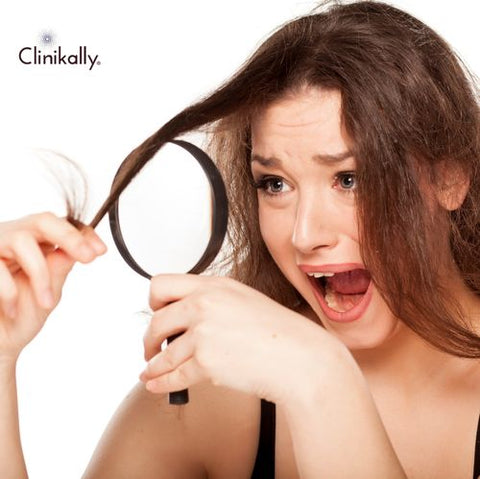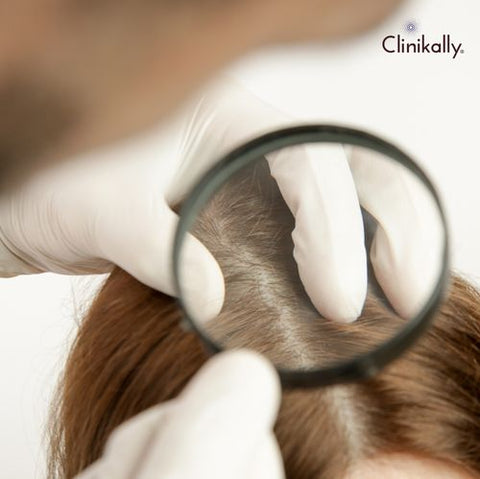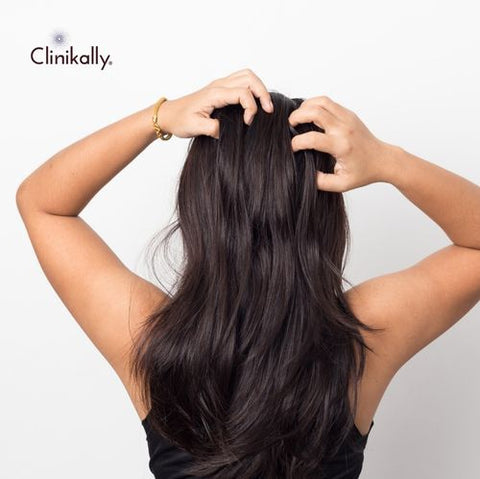We are all aware that stress is harmful to our health. What you may not realize is that it is especially damaging to your hair and scalp. When your hair begins to fall out or your scalp develops oily, flaky skin, elevated levels of stress or anxiety are frequently to blame. Stress can have a big impact on your hair, as well as your physical and mental health. Here are five ways stress can harm your hair, along with some advice for managing it:
-
Hair Loss: Stress can result in hair loss by interfering with the hair cycle, which can result in shedding or even baldness. Try to lower your stress levels through exercise, meditation, or therapy to manage hair loss brought on by stress.
-
Scalp problems: Dandruff, itching, and oiliness on the scalp can all be brought on by stress. Use a mild shampoo and scalp treatment to calm and balance your scalp to manage these scalp issues.
-
Dry and Dull Hair: Stress can make your hair appear lifeless, dry, and dull. Use a hydrating conditioner and hair mask to treat this and give your hair back its moisture and shine.
-
Split Ends: Stress weakens the hair shaft, which results in split ends. Regular hair trimming and leave-in conditioner use can help you control split ends and prevent further hair damage.
-
Premature Graying: Stress can also cause premature graying by damaging the hair follicles. Use hair products with natural ingredients that promote hair health, like biotin and keratin, to control premature graying.
To keep your hair healthy and avoid these problems, it's crucial to manage your stress levels. Here are some suggestions for lowering stress:
-
Exercise: Engaging in regular exercise can help you feel less stressed and be healthier overall.
-
Practice relaxation techniques: Techniques such as yoga, meditation, and deep breathing can help to reduce stress and promote relaxation.
-
Get enough sleep: To lower stress and advance general health, aim for 7-8 hours each night.
-
Eat well-balanced meals: Eating well-balanced meals can help to lower stress and support the health of your hair.
-
Ask for help: If you're feeling overwhelmed, don't be afraid to ask for help from friends, family, or a mental health professional.
By managing your stress levels and taking good care of your hair, you can maintain healthy and beautiful locks.
How Stress Causes Hair Loss

There are many ways that stress can result in hair loss. The following are a few mechanisms that stress may use to cause hair loss:
-
Telogen Effluvium: Telogen Effluvium is a temporary hair loss condition that can be brought on by stress. The hair growth cycle may become disrupted during times of extreme stress, resulting in an increase in the number of hair follicles that enter the resting (telogen) phase of the cycle. As a result, hair loss and increased hair shedding occur.
-
Alopecia Areata: Stress can also cause alopecia areata, an autoimmune condition that results in patchy hair loss on the scalp and other parts of the body.
-
Trichotillomania: Trichotillomania is a disorder characterized by an overwhelming urge to pluck hair from the scalp, brows, or other parts of the body. Trichotillomania can be brought on by stress. This can cause hair loss over time.
-
Vasoconstriction: Stress can also cause vasoconstriction, which is the narrowing of blood vessels. This can reduce blood flow to the hair follicles, which can weaken them and lead to hair loss.
Stress has a significant impact on hair health, and it is critical to manage stress levels in order to prevent hair loss and maintain healthy hair. If you are experiencing hair loss as a result of stress, it is critical that you consult with your healthcare provider, who can assist you in developing a treatment plan to manage your stress and promote hair regrowth.
Impact of Stress on Scalp Health

Stress can have a significant impact on scalp health, resulting in a variety of scalp issues. Here are some of the ways stress can affect the scalp:
-
Increased oil production: Stress can stimulate the production of sebum, which is the natural oil produced by the scalp. Excess oil in the scalp can clog hair follicles and cause acne, dandruff, and other scalp problems.
-
Dandruff: Stress can also cause or worsen dandruff, a common scalp condition characterized by flaking and itching.
-
Hair shedding: As previously stated, stress can cause hair shedding and loss, which can negatively impact scalp health.
-
Itching of the scalp: Stress can cause the scalp to become dry and itchy, causing discomfort and irritation.
-
Inflammation: Chronic stress can cause inflammation throughout the body, including the scalp. Itching, redness, and flaking can all be symptoms of inflammation.
Stress management is essential for maintaining a healthy scalp and hair. Stress-reduction techniques like exercise, meditation, and deep breathing can help manage stress and promote scalp and hair health. Additionally, using gentle hair care products and avoiding harsh chemicals and hot styling tools can help to maintain a healthy scalp. If you have persistent scalp problems, see your doctor or a dermatologist for further evaluation and treatment.
Hair Care Tips for Managing Stress-Related Hair Loss

If you're experiencing hair loss as a result of stress, here are some tips to help you manage your hair and promote hair regrowth:
-
Use stress-reduction techniques: Stress management is critical for promoting hair growth. Engage in stress-relieving activities such as meditation, yoga, deep breathing, or spending time in nature.
-
Eat a well-balanced diet: A well-balanced diet can promote hair growth and aid in stress management. To support hair health, consume adequate amounts of protein, vitamins, and minerals.
-
Use gentle hair care products: Avoid using harsh chemicals or hot styling tools, as these can cause additional damage to the hair and scalp. Use gentle hair care products that are free of sulfates and parabens, and avoid over-washing your hair.
-
Massage your scalp: Massaging your scalp can aid in blood circulation and hair growth. Use your fingertips to massage your scalp gently for a few minutes each day.
-
Consider hair growth supplements: Biotin, zinc, and other vitamins and minerals can aid in hair growth and prevention of hair loss.
-
Seek professional assistance: If your hair loss persists or worsens, consult a dermatologist or healthcare provider. They may advise you to use topical or oral medications to promote hair growth.
Remember that stress-related hair loss is usually temporary and can be managed with proper hair care and stress management techniques. Your hair will most likely return to its healthy state with time and patience.
Managing Stress Through Diet and Nutrition
Diet and nutrition can play an important role in stress management. Here are some dietary and nutritional tips for stress management:
-
A well-balanced diet rich in nutrient-dense foods such as whole grains, fruits and vegetables, lean proteins, and healthy fats can help to support overall health and reduce stress.
-
Processed foods high in sugar and refined carbohydrates can cause blood sugar spikes and stress levels. Instead, choose whole, unprocessed foods high in fiber and nutrients.
-
Drinking enough water is important for maintaining hydration and reducing stress levels. Aim to drink at least 8 cups of water per day.
-
Certain foods can help to reduce stress levels, such as foods rich in magnesium, omega-3 fatty acids, and antioxidants. Examples include leafy greens, fatty fish, nuts and seeds, and berries.
-
Caffeine and alcohol both have the potential to increase stress and disrupt sleep. Limit your caffeine and alcohol consumption, especially in the evening.
-
Mindful eating can reduce stress by encouraging mindfulness and relaxation. Take your time savoring your food, eat slowly, and pay attention to your senses.
Keep in mind that stress management through diet and nutrition is only one component of overall stress management. Other important strategies include exercise, sleep, relaxation techniques, and social support. You can manage stress and improve your overall health and well-being by incorporating healthy habits into your daily routine.
Mind-Body Techniques for Managing Stress
Mind-body techniques can help with stress management and relaxation. Here are a few techniques you can try:
-
Meditation: Meditation involves focusing your attention on a specific object, thought, or activity to achieve a state of mental calmness and relaxation. Meditation comes in many forms, including mindfulness meditation, which involves focusing your attention on the present moment.
-
Yoga: Yoga combines physical postures, breathing exercises, and meditation to promote relaxation and stress reduction. Yoga can help with flexibility, strength, and balance, as well as anxiety and depression.
-
Tai chi: Tai chi is a gentle form of exercise in which slow, flowing movements are combined with deep breathing and relaxation. Tai chi can help you relax, improve your balance and flexibility, and improve your overall health and well-being.
-
Deep breathing: Deep breathing exercises can help to promote relaxation and reduce stress. Deep breathing can be practiced by sitting or lying down in a comfortable position and inhaling deeply through your nose, filling your lungs with air. Hold your breath for a few seconds before slowly exhaling through your mouth.
-
Progressive muscle relaxation: Progressive muscle relaxation involves tensing and relaxing different muscle groups in your body to promote relaxation and reduce stress. To practice progressive muscle relaxation, lie down in a comfortable position and tense each muscle group in your body for a few seconds before relaxing.
It's important to find the mind-body techniques that are most effective for you because everyone's response to them varies. Regular practice of mind-body techniques can help to reduce stress levels and improve your overall health and well-being.
Choosing the Right Hair Care Products for Stress-Related Hair Loss
It's important to choose hair care products for stress-related hair loss that nourish and strengthen the hair and scalp while also encouraging hair growth. Here are some recommendations for selecting the best hair care items:
-
Choose products with nourishing components: Choose goods with nourishing components like vitamins, minerals, and essential oils. These components may aid in nourishing and strengthening the hair and scalp while also encouraging hair growth.
-
Avoid harsh chemicals: Some hair care products contain harsh chemicals that can further harm the scalp and hair, causing more hair loss. Try to find products without harsh chemicals like sulfates and parabens.
-
Think about ingredients that encourage hair growth: Look for hair care products that include biotin, keratin, and niacin. These substances have a reputation for strengthening and promoting hair growth.
-
Select a mild shampoo: Opt for a mild shampoo that will strengthen and nourish your hair and scalp while also encouraging hair growth. Avoid shampoos with strong fragrances or chemicals.
-
Use a moisturizing conditioner: Choose a moisturizing conditioner that will help to nourish and hydrate the hair and scalp. Look for conditioners with shea butter, coconut oil, and argan oil among their ingredients.
-
Think about taking hair growth supplements: Think about taking hair growth supplements that contain vitamins and minerals like biotin, vitamin D, and iron in addition to using hair care products.
Do not forget that managing stress-related hair loss requires a comprehensive strategy that includes stress reduction, a balanced diet, and a consistent hair care routine. You can manage hair loss brought on by stress by using the right hair care products and making lifestyle adjustments.
The Role of Hair Supplements in Managing Stress-Related Hair Loss

The nutrients that the body requires to support healthy hair growth can be found in hair supplements, which can help manage stress-related hair loss. The following essential vitamins and minerals are frequently present in hair supplements:
-
Biotin: Biotin is a B vitamin that is essential for healthy hair growth. It encourages the growth of new hair and strengthens existing hair.
-
Vitamin D: Vitamin D is crucial for maintaining strong hair follicles and plays a significant role in hair growth.
-
Iron: Iron is necessary for normal blood flow and may aid in promoting healthy hair growth.
-
Zinc: Zinc is crucial for strong hair growth and can stop hair loss.
-
Omega-3 fatty acids: Omega-3 fatty acids are important for healthy hair growth and can help to reduce inflammation in the scalp.
Look for a high-quality product that includes a variety of vitamins and minerals that are necessary for healthy hair growth when selecting a hair supplement. It's also crucial to take the prescribed dosage exactly as prescribed and to wait patiently for results, which can take several months. To effectively manage stress-related hair loss, keep in mind that hair supplements should be used in conjunction with a healthy diet, stress management techniques, and an appropriate hair care routine.
The Importance of a Consistent Hair Care Routine for Managing Stress-Related Hair Loss

Maintaining a healthy scalp and encouraging healthy hair growth are both benefits of a consistent hair care routine, which is crucial for managing stress-related hair loss. Following a consistent hair care regimen is crucial for the following reasons:
-
Promotes scalp health: Consistent hair care helps maintain a clean, healthy scalp, which is necessary for strong hair growth. Regular shampooing and conditioning can assist in clearing the scalp of dirt, oil, and buildup and prevent clogged hair follicles, which can cause hair loss.
-
Nourishes the hair and scalp: A regular hair care regimen helps to nourish the hair and scalp by supplying vital nutrients required for healthy hair growth. In order to prevent dryness and breakage, conditioning the hair helps to hydrate and moisturize it.
-
Helps to prevent hair damage: Consistently using the right hair care products and tools can help to prevent hair damage that can lead to hair loss. For instance, using a heat protectant spray before using heat styling tools can aid in preventing heat damage, which can make hair brittle and cause breakage.
-
Reduces stress on the hair: Keeping a regular hair care routine helps to manage stress-related hair loss by reducing stress on the hair. For instance, avoiding hairstyles that are too tight and pulling on the hair can aid in reducing breakage and damage.
Recall that treating stress-related hair loss necessitates a comprehensive approach that includes stress reduction, a balanced diet, and a regular hair care routine. Following a regular hair care regimen that entails gentle cleansing, nourishing conditioning, and protective styling can aid in promoting healthy hair growth and controlling hair loss brought on by stress.
Creating a Scalp Massage Routine for Stress Relief
A scalp massage routine can be a great way to relieve stress and promote scalp health, which is important for managing stress-related hair loss. To establish a scalp massage routine for stress reduction, follow these steps:
-
Choose a comfortable location: In order to relax and pay attention to your scalp massage, find a peaceful and cozy setting. It's best to pick a location where there won't be any interruptions or distractions.
-
Choose a massage oil: Choose a massage oil that is safe for your scalp and that you enjoy the scent of. Some good options include coconut oil, jojoba oil, or argan oil. These oils can help to nourish and moisturize the scalp, promoting healthy hair growth.
-
Warm the oil: Warm the massage oil by placing it in a bowl of warm water for a few minutes. This will make the oil more relaxing and easier to apply to your scalp.
-
Section your hair: Divide your hair into sections to make it easier to massage your scalp. Use a comb to part your hair into small sections.
-
Apply the oil: Using circular motions, gently massage your scalp with a small amount of warm massage oil on your fingertips. Make sure to cover your entire scalp with the oil, paying special attention to any areas where you may be noticing thinning or hair loss.
-
Massage your scalp: Use your fingertips to gently massage your scalp for 5-10 minutes. Be sure to apply light pressure to any areas where you experience stress or tension in order to prevent any harm to your scalp.
-
Rinse your hair: After your scalp massage, rinse your hair thoroughly with warm water and shampoo and condition it as usual.
Always keep in mind that your toolkit for preventing stress-related hair loss includes more than just a scalp massage regimen. It's important to also focus on stress management techniques, a healthy diet, and a consistent hair care routine to promote scalp health and healthy hair growth.
Incorporating Natural Ingredients into Your Hair Care Routine
You can nourish and strengthen your hair while avoiding harsh chemicals by incorporating natural ingredients into your hair care routine. The following natural ingredients can be used in your daily hair care regimen:
-
Coconut Oil: Hair can be nourished and strengthened with the aid of coconut oil, a fantastic natural hair conditioner. It also contains a lot of fatty acids, which support the growth of healthy hair.
-
Aloe vera: Aloe vera can help to moisturize and calm the scalp, which can lessen dandruff and encourage strong hair growth. It also contains a lot of vitamins and minerals that can nourish hair.
-
Apple Cider Vinegar: By balancing the pH of the scalp and removing product buildup, apple cider vinegar can encourage the growth of healthy hair. It also contains a lot of vitamins and minerals that can nourish hair.
-
Argan Oil: Argan oil is a natural oil that can help to hydrate and nourish the hair. It contains a lot of fatty acids and antioxidants that can support the growth of healthy hair.
-
Honey: Honey is a natural humectant that can help to lock in moisture and prevent hair from becoming dry and brittle. It's also rich in antioxidants that can help to promote healthy hair growth.
It's important to pick high-quality, chemical-free products when incorporating natural ingredients into your hair care regimen. You can also make your own natural hair care products at home using these ingredients. Just remember to patch-test any new products to make sure there won't be any negative reactions before applying them to your entire scalp and hair.
Adjusting Your Hair Care Routine for Seasonal Changes
To keep your hair healthy and vibrant throughout the year, it can be crucial to adjust your hair care regimen for seasonal changes. The following advice can help you modify your hair care routine to accommodate seasonal changes:
-
Winter: The air tends to be drier during the winter, which can make hair dry and brittle. Use a moisturizing shampoo and conditioner to combat this, and think about once a week using a deep conditioning treatment. If you want to add moisture to the air in your home, you might also give a humidifier a try.
-
Spring: The rain and humidity that springtime can bring can make hair frizzy. Use a leave-in conditioner to tame frizz, and think about using a frizz-reducing serum or oil. To get rid of any buildup from styling products, you might also want to use a clarifying shampoo.
-
Summer: The sun, saltwater, and chlorine can all harm hair during the summer. To protect your hair, use a leave-in conditioner with SPF, and consider wearing a hat or scarf to protect your scalp from the sun. You can also use a clarifying shampoo to get rid of any chlorine and saltwater build-up.
-
Fall: The air is typically cooler and drier during the fall, which can make hair staticky and frizzy. Use a moisturizing shampoo and conditioner to combat this, and think about once a week using a deep conditioning treatment. To help prevent static, you can also try using a leave-in conditioner.
It's critical to pay attention to how your hair reacts to seasonal changes and adjust your routine accordingly. Don't be afraid to try new products and techniques to see what works best for your hair.








































